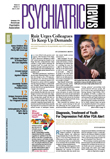Due to the stigma of mental illness that abounds in society, it is no surprise that many members of the general public want to keep their distance from individuals with schizophrenia. But perhaps less expectedly, relatives of individuals with the illness and mental health care workers may want to do so as well.
These findings emerged from a recent survey conducted in Austria. It was headed by W. Wolfgang Fleischhacker, M.D., chair of biological psychiatry at Medical University Innsbruck. Results were published in the April Acta Psychiatrica Scandinavica.
Fleischhacker and his coworkers wanted to learn more about how the general public, relatives of schizophrenia patients, and mental health personnel view social contact with individuals who have schizophrenia. They included in their study a nationally representative sample of some 1,000 Austrians; some 1,500 Austrian nonphysician mental health professionals, and about 400 Austrians who had relatives with schizophrenia. All three groups received the same structured questionnaire. Additional questions were posed according to the specific target group.
They found that mental health staff and relatives were generally more likely to accept contact with individuals with schizophrenia than the general public was. However, just as the general public was increasingly reluctant to have contact as it became more intimate, the same was essentially true of relatives and mental health staff. Specifically, all three groups were most open to having a person with schizophrenia as a neighbor, less open to having such an individual as an employee or family member, and the least open to having such a person care for their child. A recent Swiss inquiry produced similar results (Psychiatric News, November 17, 2006).
The reasons why the three groups wanted to maintain social distance as intimacy increased were, however, not always the same. For example, the major driving factor in all three groups was perceived dangerousness of people with schizophrenia. But members of the public who lived in rural areas, as well as those who believed that schizophrenia does not respond well to treatment, also tended to distance themselves from individuals with the illness. Furthermore, older relatives were more reluctant to make social contact than younger relatives. As for mental health personnel, those who were less educated were more averse to social contact than were those who were better educated.
These findings, the investigators believe, can help shape future antistigma programs. For example, because age and education seem to influence whether people are open to contact with those with schizophrenia, better education about schizophrenia, and especially better education directed at youth might be fruitful.
Also, as they pointed out, “Schizophrenia being a disorder that commonly befalls younger patients, better-informed students would not only have a better understanding for people with schizophrenia, but also a higher likelihood of detecting this disorder in early stages in their peers, thereby indirectly helping to improve overall outcomes.”
In neighboring Germany, in fact, persons with schizophrenia are being brought into classrooms to talk with students, and the exposure has led to marked changes in attitude (Psychiatric News, August 15, 2003).
An abstract of “Patterns of Social Distance Towards People Suffering From Schizophrenia in Austria: A Comparison Between the General Public, Relatives, and Mental Health Staff” is posted at<www.blackwell-synergy.com/doi/abs/10.1111/j.1600-0447.2006.00882.x>.▪
